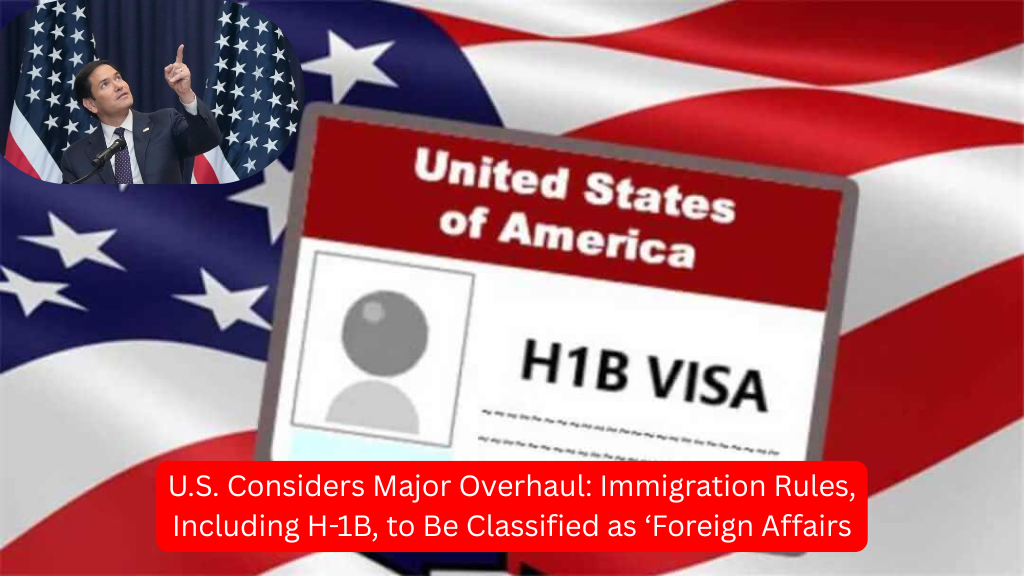The U.S. government is currently weighing a major policy shift that could significantly change how immigration regulations—including those impacting H-1B visa holders—are created and enforced. U.S. Secretary of State Marco Rubio has proposed that visa and immigration policies be reclassified as matters of “foreign affairs.” This reclassification would exempt them from the usual public notice and comment procedures typically required for policy changes.
If implemented, this proposal could have wide-ranging effects, especially for H-1B visa holders and individuals planning to work, study, or travel to the United States. In this article, we examine the potential consequences of this proposed change, the rationale behind it, and the concerns expressed by those who may be affected.
What Does the Proposed Change Entail?
The proposed policy shift, spearheaded by Secretary of State Marco Rubio, seeks to categorize immigration regulations as foreign affairs functions under the Administrative Procedure Act (APA). If this reclassification is approved, it would enable the U.S. government to:
- Bypass the public notice and comment process typically required for regulatory changes
- Enact new visa and immigration policies without public input or judicial review
- Expedite decision-making on matters involving the movement of people, goods, services, and data across U.S. borders
Understanding the Administrative Procedure Act (APA)
The Administrative Procedure Act (APA) is a federal statute that governs how government agencies develop and implement regulations. Under the APA, before any new rule can be enacted, agencies are generally required to:
- Provide public notice of the proposed rule
- Allow time for public comments and feedback
- Review and consider the input received
- Offer transparency and justification for the final decision
Reclassifying immigration rules under the foreign affairs exception would exempt them from these requirements, raising concerns about reduced transparency, limited accountability, and the potential for sudden changes that could disrupt the lives of immigrants, students, and foreign workers.
Key Requirements of the Administrative Procedure Act (APA)
1. Publish a Notice of Proposed Rulemaking (NPRM):
- Agencies must issue a public notice outlining the proposed rule.
- A comment period, typically lasting 30 to 60 days, is provided to allow public input.
2. Review Public Comments:
- Federal agencies are required to consider and address the feedback and concerns raised by individuals, organizations, and other stakeholders before finalizing the rule.
3. Judicial Review:
If there are concerns that proper procedures were not followed, affected parties have the right to challenge the rule in court.
By reclassifying immigration regulations as foreign affairs functions, the government could bypass the entire rulemaking process outlined in the APA. This has raised serious concerns about the potential loss of transparency, public participation, and accountability in how immigration policies are developed and implemented.
Why Is the U.S. Government Considering This Change?
1. National Security and Control
According to Marco Rubio, the proposed change is based on the belief that managing immigration and visa policies is fundamentally a national security issue. This viewpoint aligns with the “America First” approach championed by former President Donald Trump.
Rubio explained:
“All efforts by any federal agency to regulate the status, entry, and exit of individuals, as well as the movement of goods, services, data, technology, and other items across U.S. borders, should be considered a foreign affairs function.”
2. Reduced Bureaucratic Delays
Supporters of the proposed change argue that the current rulemaking process is overly burdensome and delays the implementation of policies intended to safeguard U.S. interests.
Eliminating the public comment period, they claim, would allow the government to introduce new regulations more quickly and effectively.
3. Alignment with Other Departments
The Department of Health and Human Services (HHS) has recently taken a similar approach by skipping public consultation on certain regulations. The State Department’s proposal appears to be an attempt to establish a uniform policy-making method across federal agencies.
Potential Impact on H-1B Visa Holders
If implemented, the proposed change could have significant consequences for H-1B visa holders and others planning to enter the U.S. under various visa programs.
| Aspect | Current Process | Proposed Process (If Implemented) |
|---|---|---|
| Public Input | Required (30–60 days for public comments) | Not required, allowing immediate enforcement of new rules |
| Judicial Review | Permitted if procedures are not properly followed | Limited or unavailable under the foreign affairs exemption |
| Regulatory Certainty | High, due to transparency and public scrutiny | Lower, with potential for sudden and unpredictable changes |
| Visa Processing | Generally consistent and predictable | Could become uncertain and subject to abrupt policy shifts |
Examples of How This Could Affect H-1B Holders
Sudden Policy Changes
Visa holders could be subjected to unexpected changes in eligibility criteria, renewal procedures, or application processes without advance notice.
Increased Uncertainty
Both employers and foreign workers may struggle to plan ahead, particularly when it comes to applying for visa renewals or extensions.
Reduced Legal Recourse
Without the opportunity for public comment or judicial review, visa holders would have limited options to challenge unfair or discriminatory regulations.
Criticism and Concerns Raised
1. Lack of Transparency
Opponents argue that bypassing the public comment process weakens transparency and accountability. New policies could be enforced without input from key stakeholders such as employers, visa holders, and advocacy organizations.
2. Risk of Discrimination
Critics warn that the proposed change could disproportionately impact immigrant workers—especially those from countries like India and China, which represent a large portion of H-1B visa recipients.
3. Erosion of Legal Protections
The APA’s notice-and-comment requirements are designed to ensure fair and thoughtful rulemaking. Eliminating these safeguards could be viewed as a breach of procedural rights and an invitation to arbitrary policymaking.
Why Is This Move Controversial?
The move to reclassify immigration regulations as foreign affairs is widely seen as part of the broader “America First” agenda promoted by former President Trump.
However, this approach stands in contrast to the traditional democratic rulemaking process, which ensures that the public has a say in shaping policies that directly affect their lives.
A Critical Moment for U.S. Immigration Policy
The proposed reclassification of immigration regulations as foreign affairs functions could significantly change how H-1B visa policies—and other visa categories—are developed and enforced. While supporters believe it will improve national security and streamline government processes, critics worry it may reduce transparency, limit accountability, and open the door to discriminatory practices.
For H-1B visa holders and employers, this potential shift introduces a new level of uncertainty, making it essential to stay informed and plan ahead.
Frequently Asked Questions
Q1: How could this change affect H-1B visa holders?
H-1B visa holders might experience sudden changes to visa requirements, application procedures, and renewal processes—without prior notice or the opportunity to provide feedback.
Q2: Can the proposed changes be challenged in court?
If immigration policies are reclassified under foreign affairs functions, traditional judicial review may no longer be available, making legal challenges more difficult.
Q3: What is the reasoning behind this proposal?
The proposal aims to give the government greater flexibility to implement immigration policies quickly, especially in response to national security concerns.
Q4: Will other visa categories be affected?
Yes, this change could impact a wide range of non-immigrant and immigrant visa categories, not just the H-1B program.
Q5: What steps can visa holders take to prepare?
- Stay informed by following official updates from the U.S. State Department
- Consult with immigration attorneys to understand your legal options
- Keep detailed records of your visa status, applications, and related documentation













